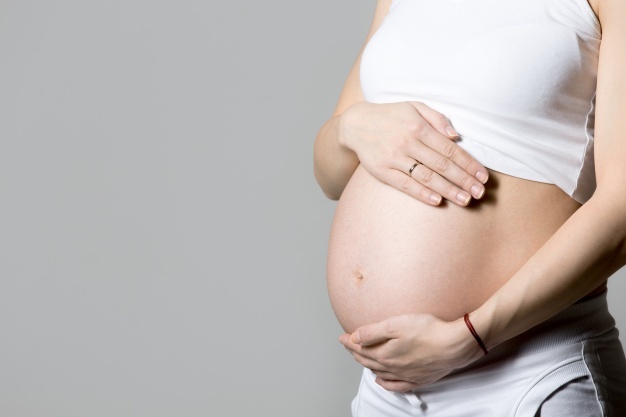5 WAYS TO DEAL WITH HEARTBURN DURING PREGNANCY.
As the name implies, heartburn is a painful feeling in your chest—but it has nothing to do with your heart. It occurs as the lower esophageal sphincter (LES), the muscle responsible for holding the stomach contents in place, starts to contract or leak. This causes the stomach acids to flow upwards through the esophagus.

Unfortunately, most women will have some acid reflux (or heartburn), particularly during the second half of their pregnancy. The painful feeling continues to get worse as your baby grows up. Heartburn commonly occurs after meals or at bedtime, which can range from uncomfortable to downright agonizing. Understanding the causes and preventive methods will help moms-to-be.
What Causes Heartburn During Pregnancy?
Pregnancy hormones are primarily responsible for heartburn, which plagues many mothers. High levels of progesterone allow the muscle between the esophagus and the stomach to contract. When this occurs, the enzymes in the stomach can pass up more quickly.
Adding to that, the developing child is putting pressure on both the stomach and the LES, raising the risk that acids will be forced up into the esophagus. When the growing uterus strains against the belly, it has less space to do its work.
5 Ways to Deal with Pregnancy Heartburn and Get Relief
So how do pregnant women alleviate heartburn during their pregnancy? Follow these five tips to relieve the symptoms:
Suggested Articles: Announcing Pregnancy: These Are The 15 Best Ways To Do That
Eat Smart; Reduce the Meal Portion but Eat More Often:
Overeating worsens your heartburn. There is less space for your stomach to stretch when you are pregnant. Maintaining a sensible diet can not only stave off heartburn in the short term but also during your pregnancy, so adding more than the prescribed weight adds more pressure on your belly, which may worsen your disease. Instead of three meals a day, you should have six mini-meals of no more than 11⁄2 cups (one and a half cups) of food each. Smaller food is healthier for the body to eat, helping to ease the effects of heartburn during pregnancy.
Eliminate foods that trigger heartburn:
Identify foods that increase your heartburn and remove them from your diet. Though there are no official “blacklisted” foods, typical heartburn causes include acidic foods like citrus fruits and tomatoes, oily or fried foods, spicy foods, chocolate, coffee, and carbonated drinks, and alcohol (which, as you already know, you should avoid anyway!).
Focus on liquid food, or chewing properly:
Liquid foods are less likely to trigger discomfort than solids since they pass easier across the stomach. Soups, fruit smoothies, yogurt, milkshakes, protein shakes, and puddings are all healthy choices. Look for liquids that give a lot of protein, such as milk and probiotic drinks, and try to chew the solid foods properly and slowly well, until they are almost liquefied. There is this lore that if you chew your food 32 times, you get better digestion; it cannot hurt to try. Keep in mind, though, that drinking significant quantities of fluids be it water or any other drink will make heartburn worse, as drinking can force you to swallow more air. During a meal, if you feel thirsty, take little sips between bites of food.
Suggestion for you: 5 Signs That You Are Ovulating Right Now
Sleep Smart
Eat nothing for at least three hours before bedtime to prevent overnight heartburn during pregnancy. When you lay down, it gets easier for acids in your stomach to migrate up to your esophagus, thus causing heartburn.
Raise the head of your bed by putting books under the leg of your bed, and if you are not sleeping on your left side start now; it will prevent the stomach acids from traveling up to get to the esophagus.
Several people suffering from frequent acid-reflux recommend “bedges,” these are wedge-shaped pillows that gently tilt your upper body upwards to make sure that the stomach acid remains where it belongs which is in your stomach.
Women who are pregnant also should not lay down or lean over right after dinner or any meal.
Take Antacids Mindfully
Antacids can help neutralize stomach acid and provide quick relief from heartburn. It is perfectly acceptable to get comfort from a bottle of Tums, Rolaids, or other calcium-based antacids. Too much calcium will obstruct iron absorption, so do not take Tums at the same time as your prenatal vitamin. And stay away from antacids that contain aluminum (aluminum hydroxide or aluminum carbonate), which can induce constipation and even be harmful in high concentrations.
During pregnancy, aspirin-containing remedies (such as Alka-Seltzer) should be avoided, check for salicylate or acetylsalicylic acid in ingredient lists.
Also, these small changes will prevent heartburn like wearing loose clothes as tight clothes will just add to the burden on your already crammed belly, potentially worsening acid reflux. If you are looking to get rid of heartburn, go with the loose-fitting maternity dress.
If the symptoms keep worsening or do not stop then contact your doctor.
Comments
Post a Comment